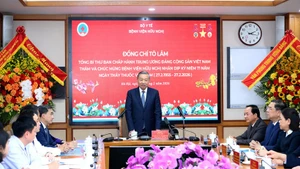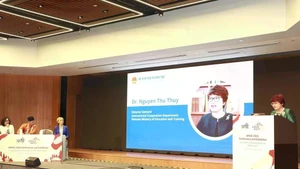Looking for "real" readers
The process of conquering and retaining readers in cyberspace of each newspaper publication is increasingly difficult, with great pressure. "Views" and "likes" are a measure of the attractiveness of information to readers.
The image of people reading newspapers every morning in big cities is gradually replaced by images of them holding smartphones or devices connected to the internet. Therefore, journalists must change their habits of producing informational content and thinking about journalism following the general trend.
The race for information to "attract" internet surfers to online newspapers leads to many consequences. For example, to increase competitiveness in terms of information speed, some newspapers accept the publication of sketchy, unverified information. Some online newspapers have misleading headlines for readers.
Many press agencies evaluate the quality of information, paying royalties to writers according to the number of "likes" and "views", putting more pressure on content creators.
News articles are produced based on "hot" keywords at times, in addition to the purpose of earning "likes", sometimes it does not bring the social impact as a real role of journalism.
So who are the real readers of online journalism? And are the number of "views" and "likes" counted through algorithms thanks to technology platforms, which represent the level of interest of technology device users for certain information content?
Several recent studies have shown that online newspapers currently face the problem of only having visitors, not readers. Many online newspapers have a skimming rate of up to 80%, while the number of people who linger to read the information for some time and visit a few pages of the newspaper is not much.
The paradox is that online newspapers are trying to find 80% of the skimmers when they should be "taking care" of the small number of remaining readers (about 20%), who have read longer articles. They are the readers who care about the news in the newspaper.
Redefining and Finding Readers
To retain readers, each online newspaper must accurately identify its real readers. Analysing to identify what types of information they read will help journalists in producing articles that are suitable for the information consumption needs of each audience.
We know that journalism survives and becomes socially prestigious thanks to its loyal readership. In that sense, even a newspaper with a large number of visitors is not necessarily a newspaper with many loyal readers.
It's time for online journalism to redefine its audience and meticulously find loyal readers who truly care about the information produced by them, not thanks to algorithms.
At the recent training programme on the digital transformation of journalism, leading experts in journalism emphasised that, in the current context of social networks and digital media developments, it is impossible to rely solely on visits to gauge the growth of a newspaper, as well as not being able to assess the capacity, to pay journalists' royalties based on high-traffic news stories.
To have loyal readers, not skimmers, online newspapers need to return to their purpose and role, constantly making efforts to provide readers with useful information and ideas, and creative, in-depth products. The quality, usefulness and ability to change readers' perceptions in a positive direction are the way to the hearts of readers, keeping them longer when accessing the newspaper. The trust of readers cannot be created by any algorithm, but entirely thanks to the internal strength of each journalist, and each press agency.
















